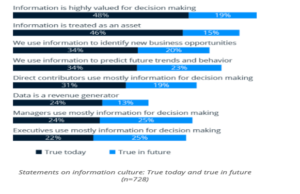While many organizations have accelerated their adoption of technology to facilitate continuing operations during the pandemic, promoting data driven decisions remains an elusive goal for many leadership teams. Driving a digital transformation for strategic impact is an achievable goal with the right plans, tools, and partners. When it comes to digital transformations for people strategy, the approach requires a specialized skill set, resources, and tools to drive impact.
We define data driven decision-making as a process involving data collection, identification of patterns and trends, and extraction of information from that data. Executives and managers then utilize this information to inform decision-making as opposed to solely relying on intuition, personal experience, or observation. As evidenced by research data, decisions made using the data driven decision making model process improves business performance and reduces bias.
Data driven decisions improve organizational outcomes and reduce bias.
Research on the state of data driven decisions in organizations suggests that while information is highly valued for decision making by almost 50% of the respondents, actual usages of data driven decision making by executives is less likely. Fewer than 25% of managers and executives are using information to inform decision making today. Most organizations have significant room for improvement and the gap between best in class organizations and other organizations is growing in the arena of data driven decision. The following chart depicts the research findings.
Source: Janoschek, “Data-Driven Decision-Making.”
The benefits of data driven decision making are clear including improved productivity, higher profitability, and reduced bias. The following highlight the benefits in greater detail:
1. Highly data-driven organizations are 3X more likely to report improvements in decision-making (HBR)
2. Improves performance and profitability -4% higher productivity and 6% higher profits (MIT)
3. Reduces biases and noise and improves verifiability of decisions
4. Enhances decentralized decisions making and improves agility and resilience
A recent HBR article highlights that the C-suite’s capacity and skills with technology and data varies widely depending upon the C-suite role. The CIO and CMOs roles report requiring the highest level of digital skills while CHROs and CFOs roles report requiring the lowest. The data indicates that CEOs technology and data skills fall somewhere in between these 2 groups. This wide variety of digital skill levels translates into a needs differential for C-suite leaders for consulting support to drive transformative change. To drive a successful digital transformation, it is crucial to consider leadership capacity differences especially in the field of people strategy. An effective plan must include time and budget for capacity building at all levels, training, and change management to promote adoption of digital transformation and create a culture for data driven decision making.
Research indicates that digital and technical skills for many in the C-suite is low highlighting the need for consulting support for digital transformations.
To ensure that your digital transformation project is a success, we suggest following these best practices:
1. Align digital transformation with Business Strategy
2. Ensure C-suite Support to create a culture for data driven decision-making
3. Develop a Digital Transformation Plan that includes needs assessment, change management, training, capacity building, process and workflow change as well as tool selection. Include diverse voices in the planning process.
4. Ensure Budget for adoption and change management which in successful transformations is over 50% of the total budget
5. Create a Tool Selection process to avoid the “shiny new toy” syndrome
6. Develop a robust plan early in the process to Engage Leadership, Managers and Employees creating a team of ambassadors and early adopters.
7. Identify Data Sources, ensure Data Quality and include Representational Data
8. Share AI Tool Functionality and Use of Data transparently. Identify meaningful metrics and People Analytics to measure and predict outcomes.
9. Share Information and Data Transparently and present information in Reports and Dashboards
10. Promote a Culture of Data Driven Decisions
People are organizations’ most important assets. Incorporating data driven decision making into an organization’s people strategy is crucial for its long-term success. If you wish to know more about how the team at HRComputes can support your organization’s digital transformation, please contact us at info@hrcomputes.com.


